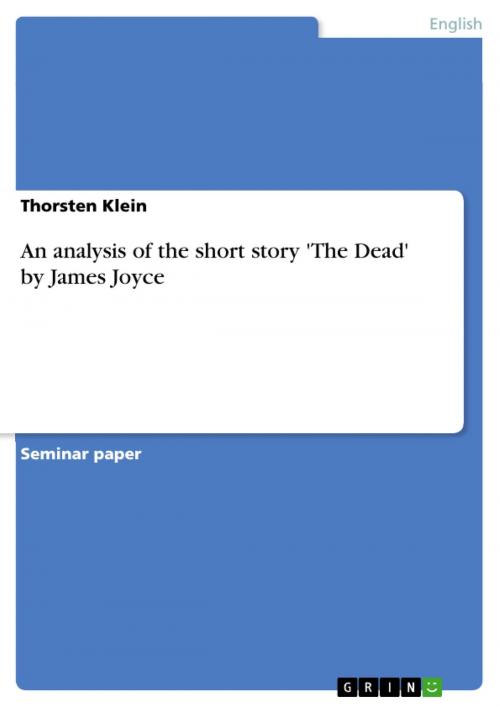An analysis of the short story 'The Dead' by James Joyce
Fiction & Literature, Literary Theory & Criticism, British| Author: | Thorsten Klein | ISBN: | 9783638556606 |
| Publisher: | GRIN Verlag | Publication: | October 17, 2006 |
| Imprint: | GRIN Verlag | Language: | English |
| Author: | Thorsten Klein |
| ISBN: | 9783638556606 |
| Publisher: | GRIN Verlag |
| Publication: | October 17, 2006 |
| Imprint: | GRIN Verlag |
| Language: | English |
Seminar paper from the year 2000 in the subject English Language and Literature Studies - Literature, grade: 1,0, University of Flensburg (Englisches Seminar), course: Literature, Culture and Politics in Modern Ireland , 12 entries in the bibliography, language: English, abstract: Opening remark Dubliners is a study on human behaviour, human values and communication. The book describes and brings to life the city of Dublin, the hometown of James Joyce, at the beginning of the twentieth century. The collection is a mix of social realism and literary imagination. Each of the 15 stories is set against a background of real names, streets, shops, pubs and icons. It also comes alive through the biographical references to Joyce's life. That is the reason why I decided to place the biography of James Joyce before my analysis in this paper. I chose the story The Dead because it seems to stand out of the short- story collection Dubliners. The Dead had not been composed when Joyce divulged that the course of the collection must be seen under the loose- knit general plan of a human lifecycle: childhood, adolescence, maturity and public life. The story also stands out of the collection because of the story's length, tone and positioning in the book. It was the last story he wrote for Dubliners in 1906/ 07, when he had already left Ireland. Before that, it was obvious that Joyce was very sceptical of the Irish Renaissance and the Irish literary revival, although the revival´s outstanding poet, W. B. Yeats, influenced Joyce's writing in the first years. He felt Ireland's future lays within the European intellectual and cultural community. Joyce became increasingly impatient with Ireland's parochialism and turned toward Europe, he and his wife Nora moved to the Continent. Now a change of attitude towards Ireland and Dublin, manifested in the story The Dead, can be observed. He wrote his brother Stanislaus in a letter the whole collection of Dubliners would be incomplete without this new feelings toward his hometown. The author's view is not only desperate and without prospect, 'it has softened' [Joyce, 1991; p. 47]. The stories in Dubliners can be read on two levels. [...]
Seminar paper from the year 2000 in the subject English Language and Literature Studies - Literature, grade: 1,0, University of Flensburg (Englisches Seminar), course: Literature, Culture and Politics in Modern Ireland , 12 entries in the bibliography, language: English, abstract: Opening remark Dubliners is a study on human behaviour, human values and communication. The book describes and brings to life the city of Dublin, the hometown of James Joyce, at the beginning of the twentieth century. The collection is a mix of social realism and literary imagination. Each of the 15 stories is set against a background of real names, streets, shops, pubs and icons. It also comes alive through the biographical references to Joyce's life. That is the reason why I decided to place the biography of James Joyce before my analysis in this paper. I chose the story The Dead because it seems to stand out of the short- story collection Dubliners. The Dead had not been composed when Joyce divulged that the course of the collection must be seen under the loose- knit general plan of a human lifecycle: childhood, adolescence, maturity and public life. The story also stands out of the collection because of the story's length, tone and positioning in the book. It was the last story he wrote for Dubliners in 1906/ 07, when he had already left Ireland. Before that, it was obvious that Joyce was very sceptical of the Irish Renaissance and the Irish literary revival, although the revival´s outstanding poet, W. B. Yeats, influenced Joyce's writing in the first years. He felt Ireland's future lays within the European intellectual and cultural community. Joyce became increasingly impatient with Ireland's parochialism and turned toward Europe, he and his wife Nora moved to the Continent. Now a change of attitude towards Ireland and Dublin, manifested in the story The Dead, can be observed. He wrote his brother Stanislaus in a letter the whole collection of Dubliners would be incomplete without this new feelings toward his hometown. The author's view is not only desperate and without prospect, 'it has softened' [Joyce, 1991; p. 47]. The stories in Dubliners can be read on two levels. [...]















